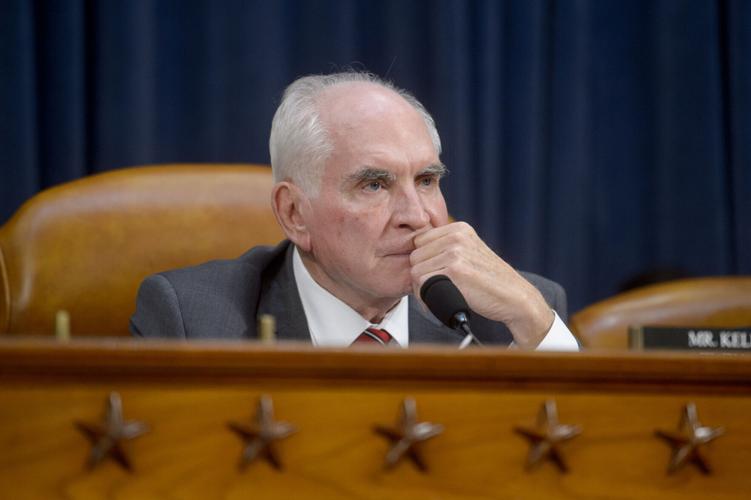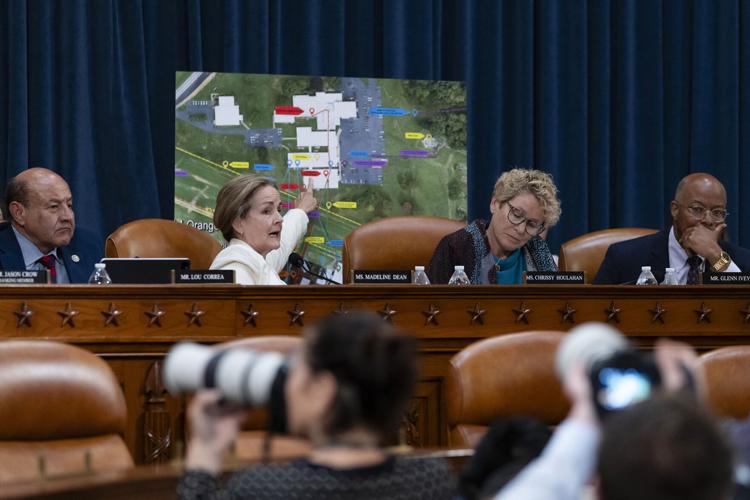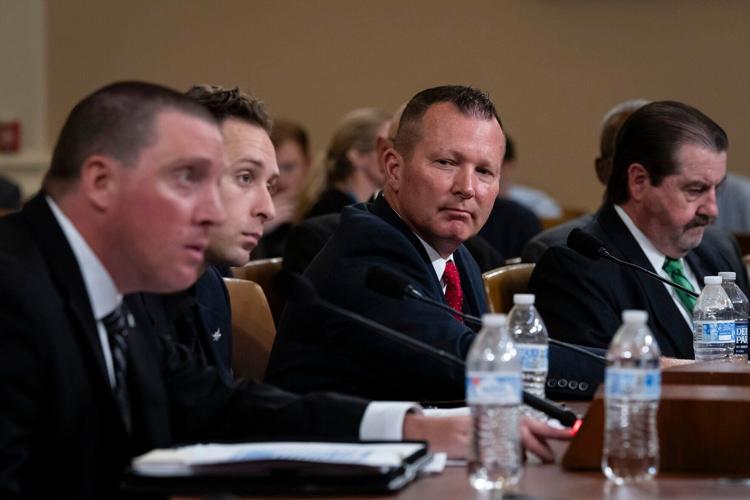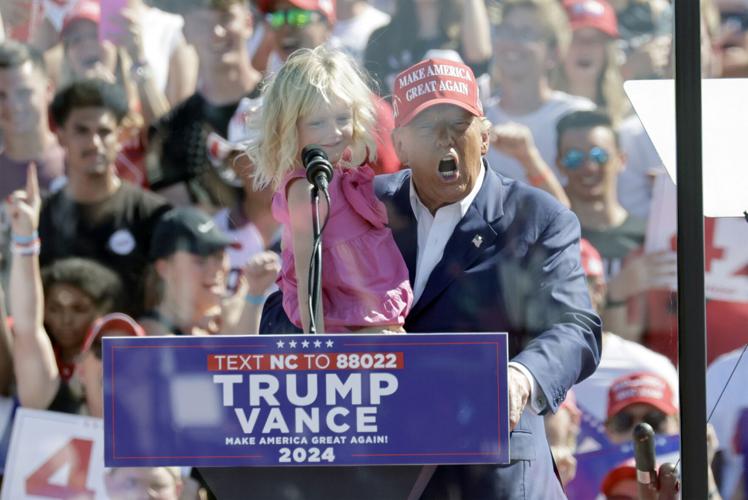WASHINGTON — Members of a bipartisan House task force investigating the Trump assassination attempts emphasized during their first hearing Thursday that the Secret Service, not local authorities, was responsible for the failures in planning and communications that led to a gunman being able to open fire on former President Donald Trump in Pennsylvania.
Lawmakers repeatedly questioned why the agency tasked with protecting the country's top leaders didn't do a better job communicating with local authorities during the July 13 rally, particularly when it came to securing the building that was widely agreed to be a security threat but that was left so unprotected that gunman Thomas Michael Crooks was able to climb up and open fire on Trump.
"In the days leading up to the rally, it was not a single mistake that allowed Crooks to outmaneuver one of our country's most elite group of security professionals. There were security failures on multiple fronts," said the Republican co-chair of the committee, Rep. Mike Kelly from Pennsylvania.

Chairman Rep. Mike Kelly, R-Pa., leads the first public hearing Thursday of a bipartisan congressional task force investigating the assassination attempts against Republican presidential nominee Donald Trump on Capitol Hill in Washington.
"The communication between the Secret Service and local and state partners was disjointed and unclear," said Rep. Jason Crow, the ranking Democrat on the panel, who also praised the local law enforcement.
Trump was wounded and a man attending the rally was killed.
The panel — comprised of seven Republicans and six Democrats — spent the last two months analyzing the security failures at the rally, conducting almost two dozen interviews with law enforcement and receiving more than 2,800 pages of documents from the Secret Service.
The lawmakers are also investigating a second attempt on Trump's life that happened this month where a man with a rifle sought to assassinate the GOP presidential nominee while he was golfing at one of his courses in southern Florida.
But the hearing Thursday focused on the rally shooting with testimony from Pennsylvania and Butler County police officials.
The Secret Service often relies on local authorities to secure bigger events where protectees like Trump appear around the country. But after the Butler rally, the agency was heavily criticized for failing to clearly communicate what it needed from those local agencies that day.
One key question has been why there were no law enforcement personnel on top of the AGR building where Crooks eventually climbed up and took his shots, considering that it was so close to the rally stage and afforded a clear line of sight to Trump.

From left, Rep. Lou Correa, D-Calif., Rep. Madeleine Dean, D-Pa., Rep. Chrissy Houlahan, D-Pa. and Rep. Glenn Ivey, D-Md., ask questions Thursday in front of a site map at the first public hearing of a bipartisan congressional task force investigating the assassination attempts against former President Donald Trump on Capitol Hill in Washington.
"A 10-year old looking at that satellite image could have seen that the greatest threat posed to the president that day" was the building near the stage, said Rep. Pat Fallon, R-Texas.
Edward Lenz, commander for the Butler County Emergency Services Unit who was in charge of the local tactical units operating at the Butler rally, said his agency was never asked to put a sniper team on top of the roof and never said that they would. Lenz said the Secret Service knew their shooters were inside the AGR Building — a position designed to allow them to look for threats inside the rally crowd as opposed to threats to the president from outside — and there was no "feedback or guidance" from the Secret Service that they wanted the team anywhere else.
"They knew where we would be," Lenz said. "They knew what our plan was."
Lenz also testified that Secret Service officials did not check with him or his team to make sure they were in place before Trump went on stage and that the emergency communication for July 13 had not been worked out in advance.
Drew Blasko, an assistant team leader of the sniper unit within the Butler Township Emergency Services Unit, testified that he shared his concerns about the building with the Secret Service ahead of the rally and said his team didn't have the manpower to post anyone there.
He said he asked the Secret Service that additional people be posted there and was told "that they would take care of it."

From left, Sgt. Edward Lenz, Commander of Butler County Emergency Services Unit, Patrolman Drew Blasko of Butler Township Police Department, Lt. John Herold of Pennsylvania State Police and former U.S. Secret Service agent Patrick Sullivan testify Thursday at the first public hearing of a bipartisan congressional task force on Capitol Hill in Washington.
Another issue that lawmakers emphasized was the difficulty of the various agencies to talk to each other on radios or cellphones. They also questioned why there were two command posts as opposed to one unified post where the Secret Service could have directly communicated with all the state and local authorities.
Patrick Sullivan, a retired Secret Service agent who was not involved in the Butler rally but attended the hearing as an expert on the agency's practices and procedures, said it was not a typical setup.
"There should be just one overall command post," he said.
Lawmakers struggled in their questioning Thursday to get witnesses to zero in on a single individual or moment that led to the assassination attempt.
Local police officials and a retired Secret Service agent also testifying instead pointed to a series of incidents and mistakes that allowed Crooks to remain undeterred for a prolonged period of time and eventually take his shot at the former president.
"Communication was totally lacking here," said Rep. Correa, a Democrat from California. "What went wrong? Who's in charge?"

Republican presidential nominee Donald Trump holds his granddaughter Carolina Trump as he speaks at a Saturday campaign event at Wilmington International Airport in Wilmington, N.C.
Thursday's session was the fourth congressional hearing about the Butler shooting since July. Secret Service Director Kimberly Cheatle resigned one day after she appeared before a congressional hearing where she was berated for hours by both Democrats and Republicans for the agency's security failures.
An interim report Wednesday from the Senate Homeland Security and Governmental Affairs Committee, which is also conducting an investigation, said the Secret Service failed to give clear instructions on how state and local officials should cover the building where the gunman eventually took up position. The report also said the agency didn't make sure it could share information with local partners in real-time.
The Secret Service also released a five-page document summarizing the key conclusions of a yet-to-be-finalized agency report on what went wrong in Butler.
The House panel is expected to propose a series of legislative reforms and issue a final report before Dec. 13.
Photos: Trump injured, 2 killed in shooting at rally

Republican presidential candidate former President Donald Trump is moved from the stage at a campaign rally, Saturday, July 13, 2024, in Butler, Pa. (AP Photo/Evan Vucci)

Republican presidential candidate former President Donald Trump is surrounded by U.S. Secret Service agents at a campaign rally, Saturday, July 13, 2024, in Butler, Pa. (AP Photo/Evan Vucci)

Republican presidential candidate former President Donald Trump is helped off the stage at a campaign event in Butler, Pa., on Saturday, July 13, 2024. (AP Photo/Gene J. Puskar)

Republican presidential candidate former President Donald Trump is surround by U.S. Secret Service agents at a campaign rally, Saturday, July 13, 2024, in Butler, Pa. (AP Photo/Evan Vucci)

Republican presidential candidate former President Donald Trump is surrounded by U.S. Secret Service agents at a campaign rally, Saturday, July 13, 2024, in Butler, Pa. (AP Photo/Evan Vucci)

Republican presidential candidate former President Donald Trump is surrounded by U.S. Secret Service agents at a campaign rally, Saturday, July 13, 2024, in Butler, Pa. (AP Photo/Evan Vucci)

Republican presidential candidate former President Donald Trump is surrounded by U.S. Secret Service agents at a campaign rally, Saturday, July 13, 2024, in Butler, Pa. (AP Photo/Evan Vucci)

Republican presidential candidate former President Donald Trump is surrounded by U.S. Secret Service agents at a campaign rally, Saturday, July 13, 2024, in Butler, Pa. (AP Photo/Evan Vucci)

Republican presidential candidate former President Donald Trump is helped off the stage at a campaign event in Butler, Pa., Saturday, July 13, 2024. (AP Photo/Gene J. Puskar)

People take cover as U.S. Secret Service agents surround Republican presidential candidate former President Donald Trump on stage at a campaign rally, Saturday, July 13, 2024, in Butler, Pa. (AP Photo/Evan Vucci)

Republican presidential candidate former President Donald Trump is helped off the stage at a campaign event in Butler, Pa., on Saturday, July 13, 2024. (AP Photo/Gene J. Puskar)

Republican presidential candidate former President Donald Trump is surrounded by U.S. Secret Service agents at a campaign rally, Saturday, July 13, 2024, in Butler, Pa. (AP Photo/Evan Vucci)

Republican presidential candidate former President Donald Trump is covered by U.S. Secret Service agents at a campaign rally, Saturday, July 13, 2024, in Butler, Pa. (AP Photo/Evan Vucci)

Republican presidential candidate former President Donald Trump is covered by U.S. Secret Service agents at a campaign rally, Saturday, July 13, 2024, in Butler, Pa. (AP Photo/Evan Vucci)

Republican presidential candidate former President Donald Trump is surround by U.S. Secret Service agents at a campaign event in Butler, Pa., Saturday, July 13, 2024. (AP Photo/Gene J. Puskar)

Republican presidential candidate former U.S. Secret Service agents rush the stage during. Campaign rally with Republican presidential candidate former President Donald Trump Saturday, July 13, 2024, in Butler, Pa. (AP Photo/Evan Vucci)

Republican presidential candidate former U.S. Secret Service agents rush the stage during. Campaign rally with Republican presidential candidate former President Donald Trump Saturday, July 13, 2024, in Butler, Pa. (AP Photo/Evan Vucci)

Republican presidential candidate former President Donald Trump speaks during a campaign rally, Saturday, July 13, 2024, in Butler, Pa. (AP Photo/Evan Vucci)

Republican presidential candidate former President Donald Trump is covered by U.S. Secret Service agents at a campaign rally, Saturday, July 13, 2024, in Butler, Pa. (AP Photo/Evan Vucci)

Republican presidential candidate former President Donald Trump is helped off the stage at a campaign event in Butler, Pa., Saturday, July 13, 2024. (AP Photo/Gene J. Puskar)

Republican presidential candidate former President Donald Trump is helped off the stage at a campaign event in Butler, Pa., on Saturday, July 13, 2024. (AP Photo/Gene J. Puskar)

Republican presidential candidate former President Donald Trump is helped off the stage at a campaign event in Butler, Pa., Saturday, July 13, 2024. (AP Photo/Gene J. Puskar)

Republican presidential candidate former President Donald Trump is helped off the stage at a campaign event in Butler, Pa., Saturday, July 13, 2024. (AP Photo/Gene J. Puskar)

The vehicle carrying Republican presidential candidate former President Donald Trump is surrounded by U.S. Secret Service agents at a campaign rally, Saturday, July 13, 2024, in Butler, Pa. (AP Photo/Evan Vucci)

Republican presidential candidate former President Donald Trump is helped off the stage at a campaign event in Butler, Pa., on Saturday, July 13, 2024. (AP Photo/Gene J. Puskar)

Republican presidential candidate former President Donald Trump is helped off the stage at a campaign event in Butler, Pa., on Saturday, July 13, 2024. (AP Photo/Gene J. Puskar)

Republican presidential candidate former President Donald Trump is helped into a vehicle off the stage at a campaign event in Butler, Pa., on Saturday, July 13, 2024. (AP Photo/Gene J. Puskar)

U.S. Secret Service agents converge to cover Republican presidential candidate former President Donald Trump at a campaign rally, Saturday, July 13, 2024, in Butler, Pa. (AP Photo/Evan Vucci)

Republican presidential candidate former President Donald Trump is surrounded by U.S. Secret Service agents at a campaign rally, Saturday, July 13, 2024, in Butler, Pa. (AP Photo/Evan Vucci)

Republican presidential candidate former President Donald Trump is surrounded by U.S. Secret Service agents at a campaign rally, Saturday, July 13, 2024, in Butler, Pa. (AP Photo/Evan Vucci)

Republican presidential candidate former President Donald Trump is surrounded by U.S. Secret Service agents at a campaign rally, Saturday, July 13, 2024, in Butler, Pa. (AP Photo/Evan Vucci)

Republican presidential candidate former President Donald Trump is surrounded by U.S. Secret Service agents at a campaign rally, Saturday, July 13, 2024, in Butler, Pa. (AP Photo/Evan Vucci)

Republican presidential candidate former President Donald Trump reacts as he is surrounded by U.S. Secret Service agents at a campaign rally, Saturday, July 13, 2024, in Butler, Pa. (AP Photo/Evan Vucci)

Republican presidential candidate former President Donald Trump is surrounded by U.S. Secret Service agents as he leaves the stage at a campaign rally, Saturday, July 13, 2024, in Butler, Pa. (AP Photo/Evan Vucci)

People hug after Republican presidential candidate former President Donald Trump was helped off the stage at a campaign event in Butler, Pa., Saturday, July 13, 2024. (AP Photo/Gene J. Puskar)

Police snipers return fire after shots were fired while Republican presidential candidate former President Donald Trump was speaking at a campaign event in Butler, Pa., on Saturday, July 13, 2024. (AP Photo/Gene J. Puskar)

Republican presidential candidate former President Donald Trump pumps his fist as he is helped into a vehicle at a campaign event in Butler, Pa., on Saturday, July 13, 2024. (AP Photo/Gene J. Puskar)

U.S. Secret Service agents surround the stage during a campaign rally with Republican presidential candidate former President Donald Trump Saturday, July 13, 2024, in Butler, Pa. (AP Photo/Evan Vucci)

Republican presidential candidate former President Donald Trump covered by U.S. Secret Service agents at a campaign rally, Saturday, July 13, 2024, in Butler, Pa. (AP Photo/Evan Vucci)

A campaign rally site for Republican presidential candidate former President Donald Trump is empty and littered with debris Saturday, July 13, 2024, in Butler, Pa. (AP Photo/Evan Vucci)

People walk outside the Fiserv Forum ahead of the 2024 Republican National Convention, Saturday, July 13, 2024, in Milwaukee. Former president Donald Trump was whisked off the stage at a rally in Butler, Pennsylvania after apparent gunshots rang through the crowd.(AP Photo/Alex Brandon)

People watch news near the Fiserv Forum ahead of the 2024 Republican National Convention, Saturday, July 13, 2024, in Milwaukee. Former president Donald Trump was whisked off the stage at a rally in Butler, Pennsylvania after apparent gunshots rang through the crowd.(AP Photo/Matt Rourke)

Current chair of the Republican National Committee, Michael Whatley, right walks outside the Fiserv Forum ahead of the 2024 Republican National Convention, Saturday, July 13, 2024, in Milwaukee. Former president Donald Trump was whisked off the stage at a rally in Butler, Pennsylvania after apparent gunshots rang through the crowd.(AP Photo/Matt Rourke )

People sit in a local bar near the Fiserv Forum watching news ahead of the 2024 Republican National Convention, Saturday, July 13, 2024, in Milwaukee. Former president Donald Trump was whisked off the stage at a rally in Butler, Pennsylvania after apparent gunshots rang through the crowd.(AP Photo/Matt Rourke)

Law enforcement officers gather at the campaign rally site for Republican presidential candidate former President Donald Trump Saturday, July 13, 2024, in Butler, Pa. Trump's campaign said in a statement that the former president was "fine" after a shooting at his rally in Butler (AP Photo/Evan Vucci)

A campaign rally site for Republican presidential candidate former President Donald Trump is empty and littered with debris Saturday, July 13, 2024, in Butler, Pa. (AP Photo/Evan Vucci)







